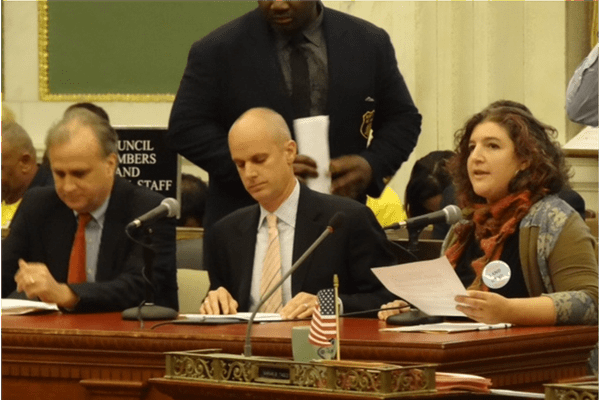Are you a community member and friend looking to propel food justice forward? Join the Grapevine and become a community advocate!
Amy Laura Cahn Testifies at City Council on "The State of the Environment"
Tagged: archive
- This topic has 1 voice and 0 replies.
-
AuthorPosts
-
-
February 7, 2019 at 11:41 pm #216894
 aliKeymaster
aliKeymasterby Kirtrina Baxter | 03/23/2015

Picture of Amy Laura Cohn, Esq. testifying at Land Bank Hearing 2013This past Wednesday our staff attorney Amy Laura Cahn testified about the state of the environment in Philadelphia. Below is her written testimony.
Philadelphia City Council Committee on the Environment
State of the Environment Hearing
Testimony of Amy Laura Cahn, Public Interest Law Center of Philadelphia
March 18, 2015
Thank you for the opportunity to testify today. My name is Amy Laura Cahn, and I am testifying in my capacity as a staff attorney for the Public Interest Law Center of Philadelphia. Today, I will provide for you a brief update on flooding and extreme weather. This is an issue of equity and environmental justice. It is our most vulnerable residents, particularly those with limited economic resources, who are most at risk from extreme weather.
As members of Council are aware, Philadelphia has experienced extreme flooding in recent years. According to studies released in 2014 by the National Oceanic and Atmospheric Administration (NOAA), Philadelphia has experienced a 650% increase in “nuisance flooding” events, which cause road closures, overwhelmed storm drains, and damaged infrastructure. NOAA attributes the increase in nuisance flooding over the past fifty years to climate change-related sea level rises, land subsidence or sinking, and destruction of natural coastal barriers from development. In May 2014, the Schuylkill River flooded and caused severe damage to the Fairmount Water Works, a National Historic Landmark and education center. This flooding also damaged the Schuylkill River Trail, which was in fact designed to help buffer flooding and is one of the first green spaces visitors encounter leaving 30th Street Station. Although both locations have made recoveries, these events serve as important reminders of the vulnerabilities of city infrastructure.
In neighborhoods such as East Germantown and Eastwick, Philadelphia residents know this increase in flooding events firsthand. East Germantown has long-experienced extreme flooding, culminating in the summer of 2011 with over three inches of rain on one September day, which caused what has been reported to be the City’s first flood-related death. In Eastwick, a neighborhood built on filled wetlands, residents report that flooding and overwhelmed stormwater drains occur with increasing frequency and intensity since Hurricane Floyd and Hurricane Irene. While the Philadelphia Water Department (PWD) has paid attention to cleaning storm drains and creating new inlets in Eastwick, PWD has no jurisdiction to address risk of more catastrophic flooding. The anxiety and concern experienced by Eastwick residents continues to be heightened by
1. Uncertainty about when Eastwick will see a holistic federal solution to flood mitigation;
2. The burden of rising flood insurance rates, as a result of recent U.S. Congressional legislation; and
3. a lack of clarity about proposed plans for new developmentin the floodplain.
Climate change projections indicate that flooding and extreme weather in our city will only worsen. Over the next thirty years, tidal flooding events in Philadelphia will grow in frequency from 19 per year to 200 per year. The result will not only be greater frequency of flooding but also degraded water quality from sewer overflows, urban runoff, and bank erosion. Philadelphia is also forecasted to receive more heat waves above 95 degrees. This will cause our city to have one of the highest projected increases in power outages on the East Coast. This and the air quality impacts are certain to increase risk, in particular, to seniors and those with respiratory disease.
It is clear that our decision-making as a city needs to evolve to protect these vulnerabilities caused by extreme weather, especially in response to climate change. As members of the Next Great City coalition, the Law Center was pleased to play a role in developing recommendations for the City of Philadelphia regarding extreme weather. I wish to highlight some of those here:
4. We need the City to make vulnerability in extreme weather a required factor in decision-making when the City invests in infrastructure. When that infrastructure is built, we need to ensure that it can withstand extreme weather.
5. We need to formalize Philadelphia’s new flood task force, including implementing FEMA’s Community Rating System, which could mitigate rising flood insurance rates, if only in modest ways to start.
6. We need the City to partner with residents and businesses to create a comprehensive public extreme weather emergency response plan and disseminate it, in all relevant languages, so all are aware.
7. We need to require that newly constructed buildings are designed to withstand increased heat, precipitation, and flooding, proactively protecting new residents and business, rather than shifting the burden of risk to them.
8. Finally, we need to protect our critical infrastructure, including hospitals and utilities, and support property owners to protect their own homes from moisture and weather exposure.
These risks are only projected to increase with climate change. However, recognizing these risks now and putting concrete plans in place to manage risks can mitigate the disastrous consequences of a lack of preparedness. The occurrence of extreme weather is not a matter of if, but when; the only question that remains is whether our city will be resilient enough to respond to these events. I urge this Committee to consider these developments, and thank you all for your time today.
-
-
AuthorPosts
- The topic ‘Amy Laura Cahn Testifies at City Council on "The State of the Environment"’ is closed to new replies.

